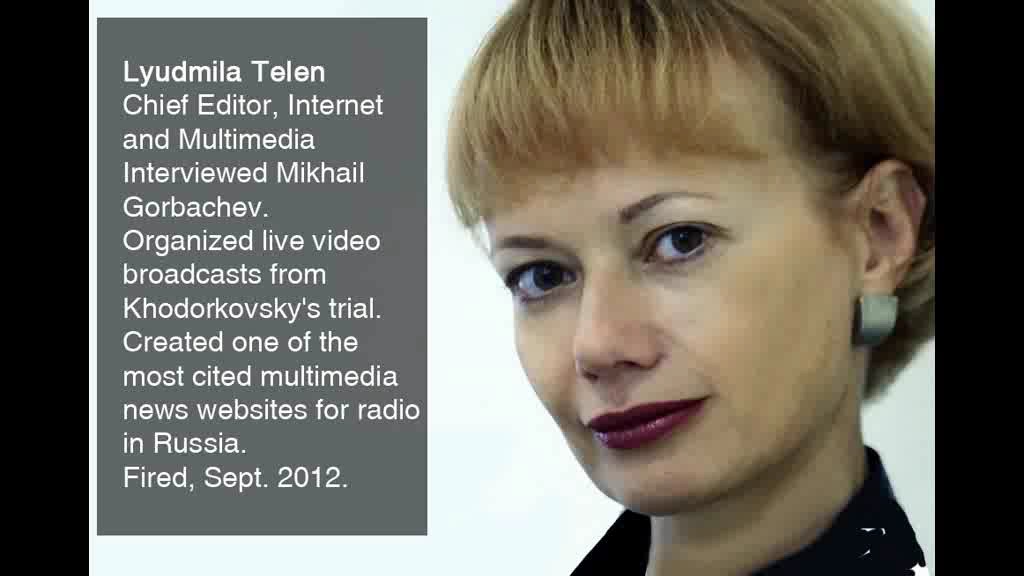BBG Watch Commentary
Yet another prestigious journalism award went to former Radio Liberty Russian reporters who either resigned in protest or were fired last September by the American management of Radio Free Europe/Radio Liberty (RFE/RL). “Four Former Radio Liberty Staffers Received 5 Different Awards” (“Четыре бывших сотрудника “Радио Свобода” получили 5 различных наград”), Lenizdat.ru, December 28, 2012. LINK

Irina Chevtayeva, who resigned in protest against the brutal mass firing of her colleagues in the Moscow bureau of Radio Liberty, won the “Anna Politkovskaya Award” for students of journalism in the nomination “for the best practices in the field of political journalism.” Anna Politkovskaya was an American born Ukranian Russian journalist, author, and human rights activist known for her opposition to the Chechen conflict and President of Russia Vladimir Putin. On 7 October 2006 Politkovskaya was shot and killed, an unsolved assassination that continues to attract international attention. Several journalism awards have been named in her honor.
The news of Irina Chevtayeva’s Anna Politkovskaya student award came after the Broadcasting Board of Governors (BBG), the federal agency in Washington that oversees taxpayer-funded Radio Free Europe/Radio Liberty, had issued an unusual press release about other journalism awards won by Chevtayeva’s colleagues who were either fired on orders of RFE/RL president Steven Korn or resigned in protest.
The BBG press release did not point out that the award-winning former Radio Liberty journalists were either fired or resigned in protest. But the publication of the press release, which also mentioned current Radio Liberty reporters who received awards, was in itself another sign that Steven Korn’s days at RFE/RL are numbered.
The BBG press release on the awards for the former Radio Liberty reporters was issued after Korn’s actions produced an outrage among independent journalists, human rights activists, and opposition political leaders in Russia, including Lyudmila Alexeeva and Mikhail Gorbachev.
The RFE/RL Board, which consists of members of the Broadcasting Board of Governors, is expected to meet Monday to discuss Korn’s resignation, which is believed to be imminent. There is no word, however, on what the BBG intends to do about the Radio Liberty journalists who were fired or resigned, about Korn’s closest deputies Julia Ragona and Steven Cohen who oversaw the firings, or his choice of Masha Gessen for the director of the Russian Service, whose team replaced some of the fired journalists, including qualified staffers with disabilities.
Gessen insists that she had nothing to do with the firings, which happened after her appointment was announced but before she came officially on board and later brought her own team.

The BBG has reportedly already stripped Korn of his authority to fire, but his chosen director of the Russian Service Masha Gessen has just fired Radio Liberty’s full time contract reporter Elena Polyakovskaya, a single mother and journalist with 20 years of television and video experience who had covered the Khodorkovsky trial, the Pussy Riot trial, and reported on video documentaries about murdered journalist Anna Politkovskaya.
Elena Polyakovskaya (her bio page with a list of recent reports is still on the RFE/RL website) apparently annoyed Gessen with her defense of her fired colleagues and criticism of changes to the Radio Liberty website, which have resulted in a significant drop in site visits. Another still employed and well known Radio Liberty journalist Andrei Babitsky was ordered to apologize for his criticism of the new Radio Liberty management.
Polyakovskaya was told that her services were no longer needed because Radio Liberty is limiting radio production, even though the Radio Liberty website shows numerous online reports which she has produced. Many of her reports deal with human rights issues. Polyakovskaya had a freelance employment contract, but like many other Radio Liberty employees she was assigned a full time schedule, which may be a violation of Russian labor laws. She plans to challenge her firing in court and is writing a letter to the Broadcasting Board of Governors, sources told BBG Watch.
Such callous and insensitive personnel and management practices by Steven Korn and his hand-picked managers have led to the departure of several talented young journalists like Elena Vlasenko, Irina Chevtayeva, and Anastasia Kirilenko. Read: “The death of Radio Liberty” by Anastasia Kirilenko, openDemocracy, November 5, 2012.
Kirilenko resigned after Gessen refused to approve her requests for investigative coverage of political corruption and suggested to reporters focus instead on more human interest stories, such as the state of kindergartens in Russia. Gessen called it a return to “normality” and promised Korn and the BBG that such reporting can greatly increase the number of visitors to the Radio Liberty website. But Russian media reported, citing openly available statistics, that since Gessen redesigned the website, the number of visitors has dropped by more than half.
Chevtayeva, a student of the Faculty of Journalism at the Lomonosov Moscow State University, also received another journalism award from the Interfax news agency. She worked at Radio Liberty as a freelance reporter.
RFE/RL executives deny that they did anything wrong and claim that they had treated the journalists generously and with great respect. They insist that all journalists had resigned voluntarily.
Steven Korn implied to the BBG that some of the journalists who had resigned, including Dr. Anna Kachkaeva, the dean of the Media Communications School at Moscow Higher School of Economics (HSE) who was Radio Liberty’s expert on Russian media, may have been lured by an offer of severance pay and then presented their resignation as a protest.
Dr. Kachkaeva said that she could not stand the sight of RFE/RL-hired security guards preventing Radio Liberty journalists from entering their news bureau in Moscow, not even to say good bye to their radio and online audience.

Chevtayeva, like another young journalist Elena Vlasenko, was not fired but left the station in protest. Elena Vlasenko was a finalist for the Andrei Sakharov Award for Journalism as an Act of Conscience. Certificates for this award were issued to finalists and the news organizations that published their work, but the Sakharov Award jury refused to hand over the certificate to Masha Gessen and her team.
Gessen declared the Sakharov human rights journalism awards to be a low profile event in Russia and refused to cover them for Radio Liberty. She has redesigned the Radio Liberty website and de-emphasized news coverage, including human rights event such as the Sakharov awards, but kept on the home page for many days an outdated story on topless bars, drugs, and a professor from an American university who traveled to Argentina to join an attractive woman he met online. The story included an image of sexy young women dressed in skimpy costumes made of American flag.
Fired Radio Liberty reporter Elena Polyakovskaya, who protested against such news coverage choices, said that they ruin the station’s brand and reputation in Russia, a view shared by many independent journalists and human rights and opposition leaders, as well as former radio listeners and visitors to the old Radio Liberty award-winning website.

“The awards won by former employees of Radio Liberty prove that talk by the current management of the station about our inability to practice modern journalism, including multimedia, is nonsense,” said Lyudmila Telen, the fired chief editor of the old Radio Liberty Internet team (its members also fired) who received the Honor, Dignity & Professionalism award from the Russian Union of Journalists for her former work at Radio Liberty. Telen was hired to be the editor in chief of a popular Russian investigative journalism magazine Sovershenno Sekretno. Kristina Gorelik, a fired Radio Liberty human rights reporter received The Moscow Helsinki Group human rights reporting award.
Lenizdat.ru reported that the fired journalists and their colleagues who resigned in protest have formed Radio Liberty in Exile and launched a multimedia “Novaya Svoboda” (New Liberty), SvobodaNew.com. They also produce videos for the portal OnlineTV.

Mikhail Sokolov, one of the best independent political reporters in Russia who was fired, had a live video interview Thursday at OnlineTV with ex Kremlin advisor Andrey Illarionov.
http://www.onlinetv.ru/video/565/?autostart=1
“It is an experiment only. Not a job,” Sokolov said about Radio Liberty in Exile work with OnlineTV. “We are showing that we can do any kind of multimedia digital journalistic work while Gessen only can boast,” Sokolov said.
His former colleague Lyudmila Telen, who led the fired Russian Internet team at Radio Liberty in Moscow and is now modernizing the website of Sovershenno Secretno also mentioned to Lenizdat.ru Mikhail Sokolov’s historical programs on a popular and somewhat independent FM Moscow news radio station Ekho Moskvy. Lenizdat.ru also reported that some other former Radio Liberty journalists, including Irina Chevtayeva, Yuri Timofeev, Kirill Filimonov, Yuri Vasiliev have had their work published by several Russian newspapers after leaving RFE/RL.
Gessen and her team lack such connections or support among independent journalists and opposition leaders. Independent journalists are especially incensed by her accusations of slander against her critics. Many of them, as well as prominent human rights and opposition leaders, are boycotting the official Radio Liberty. President Putin had signed a law making slander a criminal offense in Russia in an apparent effort by the Kremlin to stifle criticism and investigative journalism. Gessen’s decision not to cover the Sakharov human rights journalism awards should not have surprised anyone.



Comments are closed.